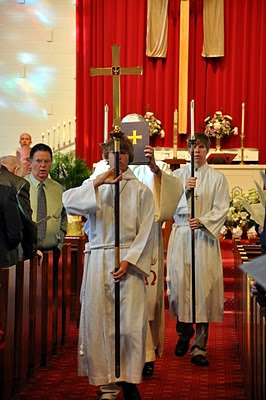Apparently the thing to do nowadays is to hold a rally. Specifically, if you want to whip up enthusiasm for your cause and restore something to the center of the political or social landscape, just reserve some large public space and rally people. Yesterday, for example, in our nation’s capital, comedians John Stewart and Stephen Colbert held their Rally to Restore Sanity and/or March to Keep Fear Alive. Authorities will likely dispute the number of people who showed up to take part in an event that was both silly mockery of current political discourse as well as serious statement on certain political positions, but suffice it to say the National Mall was crawling with people who were there to rally. Stewart’s and Colbert’s rally was, of course, a response to the Tea Party’s Rally to Restore Honor—held in late August—which likewise attracted untold thousands to Washington, D.C.
So, if rallies are the thing to have, today, Lutherans the world over—more than 70 million of us!—will hold their Rally to Restore their Lutheran Identity. In Wittenberg, Germany, where the Protestant Reformation unwittingly got kicked-off 493 years ago to this day, townspeople will dress up like Martin Luther and his wife, Katie, and hand out shrink-wrapped copies of his Small Catechism on every street corner. You’d better believe that in Lutheran congregations across the globe, the rousing strains of “A Mighty Fortress is our God” will be belted out, just as you can believe that worshipers will mutter under their breath about how they liked the version in the old red hymnal better.
 |
| photo by Meredith Sizemore (www.wix.com/MSizemore/Meredith-Sizemore-Photography/) |
However, when the last chords of the pipe organ fade away today, and the Lutheran-red blouses and vests are hung back in the closet to be worn another time, maybe Pentecost, we still might have failed to grasp the true meaning of this day and the movement of which it reminds us. For this is most certainly true: any celebration of the Reformation or commemoration of Martin Luther’s criticisms of the Roman church in the early 1500’s is really a rally to restore the church. The Protestant Reformation did not occur to establish a particular group’s identity, or to declare theological supremacy, or even to found a denomination named “Lutheran” or “Reformed.” The Reformation happened as a result of an attempt by several church men and women to reiterate a message of God’s grace. They preached it from church pulpits, they discussed it over their family meal tables with their children, they stood in front of fearsome Councils and Diets to defend it, and yes, they even nailed it to church doors, as was common practice in those days for starting a university debate or posting a public notice.
The point of the Reformation was not so much about human identity as it was about the very nature of God and the crux of the news about his Son. As the apostle Paul puts it in his letter to the church in Rome, written roughly fifteen centuries earlier: “For we hold that a person is justified by faith apart from works prescribed by the law.” That was it, in a teeny-tiny nutshell. Essentially it is very church-y, theo-speak that means this: no more working or buying or reasoning or even praying your way to God’s good favor. God gives it to us on his own accord. In fact, God heaps it upon us, undeserved, like a helping of German potato salad. In the loving arms of Jesus Christ, God accepts us freely and transforms us graciously to be his people and nothing this world can throw at us can ever change that. “For there is no distinction,” the apostle also says, “since all have sinned and fall short of the glory of God; they [who have sinned] are now justified by his grace”—that is, made right, set free from sin, forgiven—“as a gift, through the redemption that is in Christ Jesus, whom God put forward as a sacrifice of atonement by his blood, effective through faith.” A reiteration of grace.
These words of Paul can send chills of gratitude and wonder down our spines, but for Martin Luther, they struck across the page and straight into his soul like the bolt of real lightning that had initially sent him from law school to the monastery. Besieged for his whole life by the idea that he would never be able to satisfy a righteous God, and influenced by a religious system that had obscured the message of grace with all kinds of pietistic hoop-jumping and money-making evangelism strategies, Luther had convinced himself that God would never think he was good enough. Yet Luther realized after reading and re-reading Paul’s letter to the Romans, a central message that appeared again and again throughout Scripture: that through the life, death and resurrection of Christ, God had indeed found Luther and declared him good. Christ’s faithfulness to the covenant, even to the point of death, had secured for all people the mercy of God.
 |
| Hugo Vogel, 19th c. |
Much has been written about the socio-economic and geopolitical forces that enabled Luther’s reforms to go viral and, in the process, transform the western world, but we cannot forget that one of the main reasons that the message of the reformers spread so well and so fast was because one of the dominant questions people more or less seemed to be asking was “How do I find a gracious God?” It was certainly the main question on Luther’s mind, the monkey on his back, so to speak, that led him to those passages of grace: “How do I find a gracious God?” The answer came back, and resounds to us even now—in the Word; in the water of baptism; in the bread and the wine; and in what Luther called the “mutual conversation and consolation among the brethren and sistren”: in Jesus Christ, Our Lord.
I’m not so sure that is the dominant question that people, even fairly religious ones, ask these days. In a culture where more and more people describe themselves as un-churched or even agnostic, where denominational identity even among believers is on its last legs, and, most of all, where rugged individualism rules the day, I’m not so sure that many people ask “How do I find a gracious God?” I hesitate to speak for an entire cultural ethos (especially when I don’t dare speak for my family without first consulting with my wife), but I would venture to say that the dominant question people are asking today concerning faith is, “How is this relevant?” “How does this apply to me and what I’m experiencing?”
As I listen to the voices of both criticism and praise in faith and culture, and as I peruse Bible study curriculum for youth and young adults, that question appears to be the one that is forefront in people’s minds—articulated or not. I would venture to say that most people can find a gracious God, and maybe even recognize there is one to be met in Jesus Christ. But the prevailing sentiment is, “So what?” Like Sally, who upbraids Linus for enticing her out into the pumpkin patch to await the Great Pumpkin, folks these days are wondering “what’s the point?” I know that I, myself, am often bound to pose the same questions and wonder if it’s really worth missing the Hallowe’en party at Violet’s house to be drawn into the life of faith.
To make it worse, basic foundations to Christian faith can often come across like antiquated, superstitious, empty tradition. Bedrocks like the holy sacraments, regular Sunday worship and even the Holy Scriptures become more and more distant to a culture that upgrades and uploads to a faster, flashier, mode of communication every three months. It is so easy, in such a technology-saturated culture, to fall into thinking that the present is superior to everything that came before us, just as we expect, in so many ways, that the next-version-of-whatever will be more advanced than what came out last week. In many ways, it becomes difficult to adhere to the authority of ancient Scripture, despite the fact that it is a living Word.
That, I would suggest, is where our rallying comes in. As those who know they have been claimed by a gracious God, we rally to spread the news that the life of faith is really what keeps us alive. We rally to restore the church—not so much as placing it at the center of world influence but holding it accountable to the gospel. Yearly, weekly, and minute-by-minute this rally will continue as we reach into God’s Word and gather as his people for worship. Will Willimon, former dean of the chapel at Duke Divinity School says that the church “is never-ending training in learning to trust the Bible, learning to take ourselves a little less seriously and the Bible a little more so.” (William H. Willimon, Pastor: the Theology and Practice of Ordained Ministry. Abingdon Press, 2002. pg 125)
As we do that, as we strengthen our trust in the Bible, the body of Christ will need you to reach into your own story to find those theses—those points of meaning where grace has slapped you upside the head—and nail them to the front door of your life, for all to see.
And you will be relevant, if relevance is what the world wants so badly. Rest assured that we will be relevant because we will be introducing them to Jesus. We won’t be introducing them to a program, or an ideology, or even a wonderful congregation. We will be introducing them to Jesus, who is relevant—who dies to be relevant—and always will be in ways in which our sinfulness will often blind us.
“God’s Word forever shall abide, no thanks to foes, who fear it.
For God himself fights by our side, with weapons of the Spirit.”
Sounds like a rally cry, doesn’t it?
“Were they to take our house, goods, honor, child, or spouse…
Though life be wrenched away, they cannot win the day.
The kingdom’s ours. For…ev…ER.”
OMG! Forever.
Thanks be to God!
The Reverend Phillip W. Martin, Jr.





